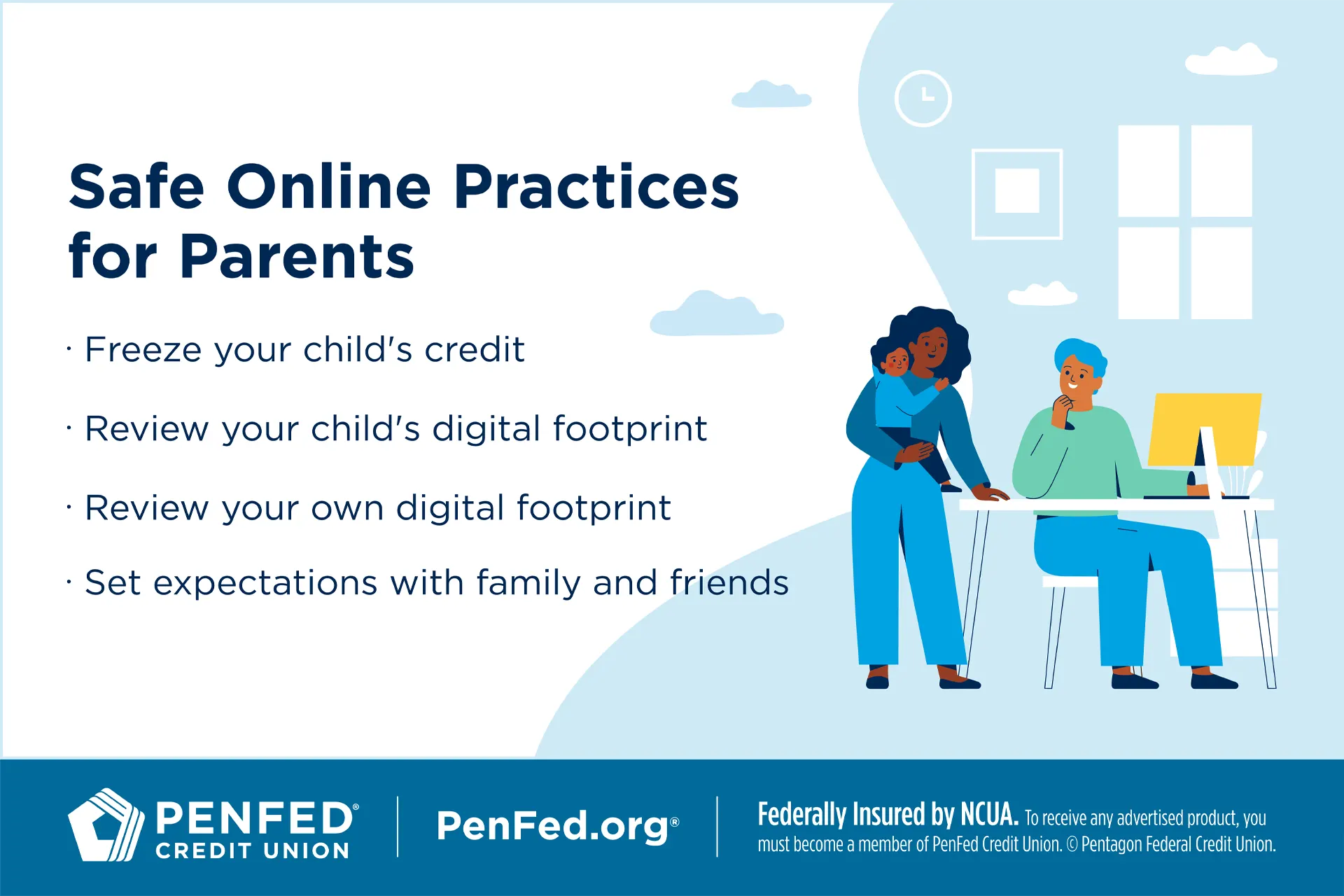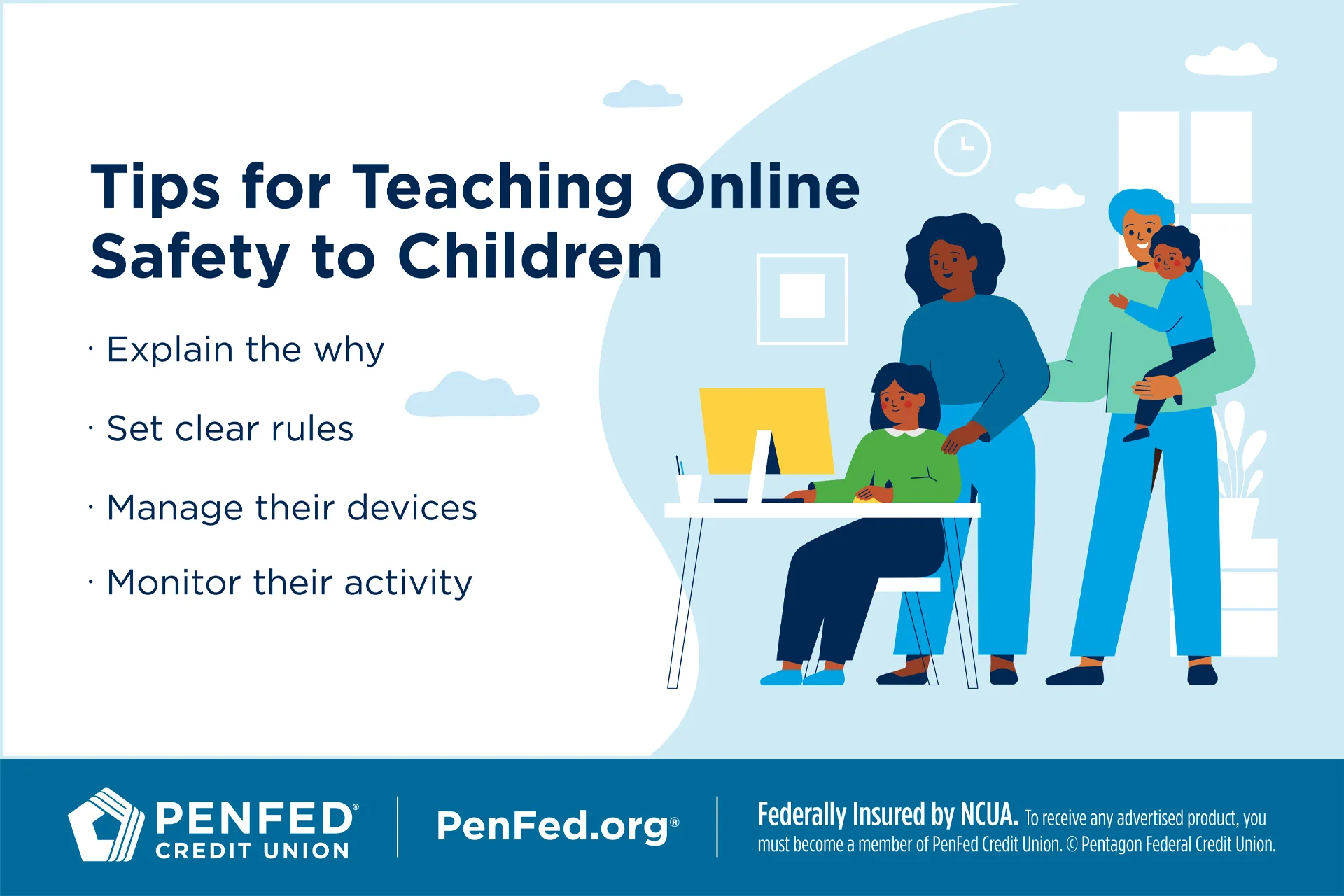Finance
Protect Your Children’s Personal Data Online
What you'll learn: How to protect your children’s personal data
EXPECTED READ TIME: 5 MINUTES
These days, personal data finds a home online sooner than you might think. Educational tracking, online registration for afterschool activities, and one-to-one devices in schools mean that even kindergarteners now have personal data profiles online.
It’s easier to keep records tight right from the start than it is to try to clean up identity theft later. Here’s how to keep your children’s personal data safe and secure.

What Counts as Personal Information?
You know some of the personal information you shouldn’t share online: your social security number, credit card number, and online banking login. But there’s also seemingly benign information that could put you or your child at risk, including:
- Full legal name
- Full birthday
- Full names of parents, grandparents, and siblings
- Home address and phone numbers (theirs, yours, and a landline/home line if applicable)
- School name and location
- Common hangouts and routines
Information like your birthday or the names of family members is often used to recover lost passwords or log onto websites. If you share this information in passing with someone, they may be able to use it to access password-protected accounts.
Data about your child’s location and schedule — such as your child’s school name and address, or afterschool activities and when they happen — make it possible for anyone to meet with your child in person with or without your knowledge.
Photographs Can Contain Personal Information
Digital photographs taken with your phone or camera contain more information than you may realize. Beyond visual clues about your identity and location, they contain metadata embedded in the photo. Metadata includes information about the camera and picture, but it can also reveal information about:
- The identity of the person who took the photo
- GPS coordinates showing where the image was taken
- Timestamps of when the photo was created
Sometimes social media sites remove metadata when photos are uploaded, but not always. To be safe, you can manually remove metadata from photos before sending them.
What Are the Risks of Sharing Photos of Children Online?
One of the biggest risks of sharing a photo online is that once you hit "send," you can’t control who shares that photo or what they do with it. This could expose them to a number of risks including identity theft, bullying or even potential future prospects. The safest course of action is to not share photos with anyone you don’t know and to keep social media accounts private if they contain pictures of your children.
The safest course of action is to not share photos with anyone you don’t know and to keep social media accounts private.
That adorable potty-training photo may seem endearing now, but how will they feel if it surfaces in middle or high school?
Teaching Online Safety to Children

Teaching your children about online safety and privacy is essential for protecting them. After all, they’ll eventually start using the internet and have to make choices about what information they share and with whom.
Explain the Why
Getting buy-in from your kids is an important part of persuading them to follow the rules you set. You may worry that talk of identity theft and predators will scare your children, but they also need to understand why digital privacy matters and the long-term repercussions of their choices.
Keep things age appropriate. It’s OK to simplify explanations for younger children. Accept that these conversations will be ongoing as your child matures, and provide more detail as needed. You can also turn to online resources like the FTC’s Protecting Kids Online for help getting started.
Getting buy-in from your kids is an important part of persuading them to follow the rules you set.
Set Clear Rules
Remind your kids that anything and everything they share online is permanent. Just because they delete something doesn’t mean other people haven’t saved or shared it, and deleted content may still be saved on a website’s servers. Encourage them to create an honest, positive digital footprint.
Be specific about who your children can communicate with online, how they are allowed to communicate, and what kinds of things they can share. Remind your children that subscribers and followers are not the same thing as friends and that they need to interact with online friends differently than they do with offline friends.
Set rules around which social media platforms and websites your kids can join and how they’re allowed to engage on these platforms. For example, maybe you’re not comfortable with them uploading videos that show their faces, but you allow them to upload videos they animate.
Remind your children that subscribers and followers are not the same thing as friends.
Manage Their Devices
Your child may know how to create viral TikToks or elaborate Photoshops that leave you awestruck, but they may be less adept at the practical parts of managing their device. The same steps you take to protect your phone from hacking can help keep your child safe, such as:
- Using a screen lock on the device
- Keeping the operating system and apps updated
- Enabling two-factor authentication
- Restarting the device weekly
- Enabling firewalls and virus protection on computers
Consider utilizing a family hotspot instead of unsecured public Wi-Fi when using devices in public or while staying in hotels or vacation rentals. It may also be worthwhile to invest in a password manager that offers family accounts. This will help your children create secure passwords, and you’ll be able to safely share passwords to things like your home Wi-Fi or streaming services.
Consider utilizing a family hotspot instead of unsecured public Wi-Fi when using devices in public or while staying in hotels.
Monitor Their Activity
As with the conversations you have about internet privacy, how you monitor your child’s online activity will change as they grow up. When they’re younger, you can start simply by:
- Reviewing their apps. Check the app’s maturity rating and skim reviews for complaints about data collection and other suspicious behavior.
- Checking their privacy settings. Many sites allow you to hide surnames, only show usernames, hide birthdays and location data, share posts only with people you know, and block messages from strangers. However, you may have to turn on these features manually.
- Skimming their friends list. Glance through their friends list and comments on their posts to see who’s engaging with them. You can block or report strange adults or inappropriate users communicating with your child.
- Completing online safety training. There are many free courses your child can complete to learn about online safety, such as the FBI’s Safe Online Surfing Program. These courses don’t replace honest conversations with your child, but they can reinforce lessons you’ve taught them. You may even learn something by completing them together!
- Spending time together online. This will help you know what sites your child frequents and who they interact with. You’ll have the opportunity to model good online privacy and address misinformation or inappropriate content you come across.
- Encourage offline activities. While it’s important that children learn to use the internet, getting kids involved in sports, music, scouts, and other offline activities will reduce the time they spend online and the importance they place on their online identity.
There are many free courses your child can complete to learn about online safety, such as the FBI’s Safe Online Surfing Program.
Privacy Settings and Parental Controls
There are tools designed to help parents control their children’s internet use. These controls fall into three categories:
- Network-level controls: settings in your router that affect all devices connected to your network
- Device-level controls: settings in individual devices (phones, laptops, tablets, etc.) that always affect the device regardless of where it connects to the internet
- Application controls: settings in the website, app, or software that’s being used
These tools are a good place to start, but realize that older kids and teens will find ways to bypass them. They may also create multiple social media accounts as a way to share or access content parental controls have blocked. That’s why the only real way to protect your child is to talk to them directly.
Safe Online Practices for Parents
How you share information about yourself, your children, and your family sets the tone for how your children will view online privacy. Even if your data privacy habits haven’t been up to par in the past, you can always start being a better steward of your family’s data by adopting new, safer habits, such as the following:
- Freeze your child’s credit. While this won’t completely prevent fraud, it will add a layer of protection.
- Review your child’s digital footprint. You can start by Googling their first and last name, but there are both free and paid tools that can help you uncover forgotten accounts, tagged photos, and even data on your child collected by marketers.
- Review your own digital footprint. Check your social media settings, close unused accounts, and turn off your location data. Be careful using cute hashtags tags that could attract unwanted attention, and limit photo sharing to people you know.
- Set expectations with family and friends. Let them know if you’re comfortable with them sharing photos of your kids, where they can share them, and whether you’re comfortable with them tagging those photos.
Once your child is old enough, you can model good online citizenship by asking before posting about or sharing photos of them.
Respecting Your Child’s Right to Online Privacy
Sharenting is a term legal experts and social science researchers use to talk about the way parents share content about their children and the impact it has on those children. Beyond the very real safety issues involved in sharenting, there are psychological and social impacts for your kids as well.
Once your child is old enough, you can model good online citizenship by asking before posting about or sharing photos of them. You might sometimes be disappointed by their "no," but you’ll be instilling an important lesson about consent.
The Takeaway
Protecting your children’s personal data online is no small feat, but it is an important role for a parent (or grandparent or other guardian). Beyond preventing identity theft, it allows them to start adulthood with a clean slate and forge an identity for themselves. It’s about both protecting and respecting the adult your child will become.
Have More Questions About Security? PenFed Has Answers.
Learn more about protecting yourself from online theft and threats.




